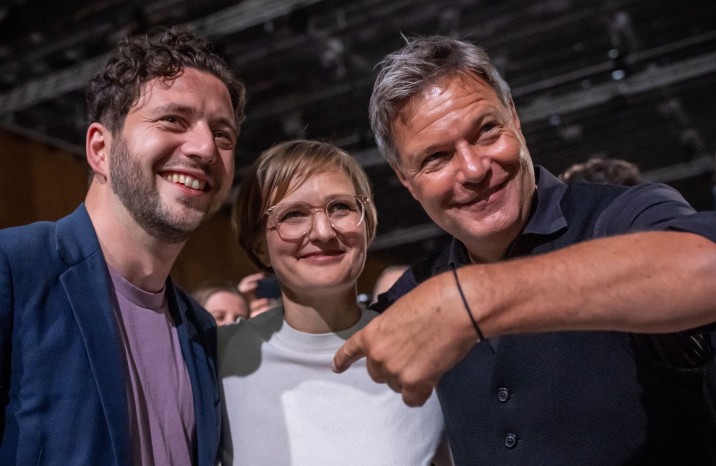By Martina Herzog and Anne-Béatrice Clasmann, dpa
WIESBADEN – Delegates elected Franziska Brantner and Felix Banaszak as the new co-chairs of the German Green Party at their national party conference in the city of Wiesbaden on Saturday.
Brantner, a parliamentary state secretary at the Economy Ministry, gained 78.15% of the vote. Seen as a pragmatist in a party that unites idealists and those favouring more pragmatic approaches, Brantner said Germany needed more investment, amid concerns about the nation’s economy.
The German government lowered its economic forecast last month, with output set to fall by 0.2% this year.
“Tightening your belt doesn’t help if you don’t have any trousers,” Brantner said in her acceptance speech.
Banaszak, from the party’s left wing, won 92.88% of the vote. He has been a member of the Bundestag since 2021, where he sits on the economic and budget committees. Both co-chairs are to serve a two-year term.
At the two-day gathering, the party is also expected to agree on German Economy Minister Robert Habeck, as its chancellor candidate for the upcoming elections.
Germany is gearing up for early elections, expected in February, following the collapse of the government coalition last week.
Germany’s pro-business Free Democrats withdrew from the coalition after Chancellor Olaf Scholz dismissed party leader Christian Lindner from his post as finance minister following months of wrangling over the 2025 budget.
Last week, Habeck confirmed he plans to run as the Green Party’s candidate for chancellor in the elections.
“I am running as the Green candidate, for the people in Germany,” Habeck said in a video released on social media.
Habeck, who also serves as vice chancellor, said last week, “I am ready to offer my experience, my skill and my responsibility – as chancellor, if you want. But that’s not my decision; it’s your decision.”
Habeck has been widely expected to run to be the Green Party’s candidate since his only serious rival, Foreign Minister Annalena Baerbock – who ran as the Green chancellor candidate in the 2021 election – said she would not pursue a candidacy for chancellor in the next election.
At the end of September, Baerbock told the German broadcaster ARD: “Robert Habeck is the one who will lead us into the federal election campaign.”
If nominated, Habeck will need to tread a fine line to win over centrist voters without alienating his party base. As economy minister and vice-chancellor, he has negotiated compromises that the left wing of his party has resented, including on tighter migration policies.
The Greens currently languish at between 10% and 12% in the polls. Habeck in particular is likely to face resistance due to Germany’s poor economic situation, with wrangling over economic policy having triggered the collapse of the coalition.
